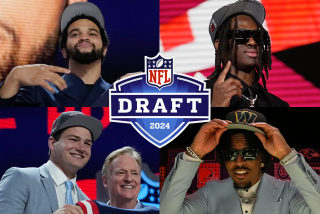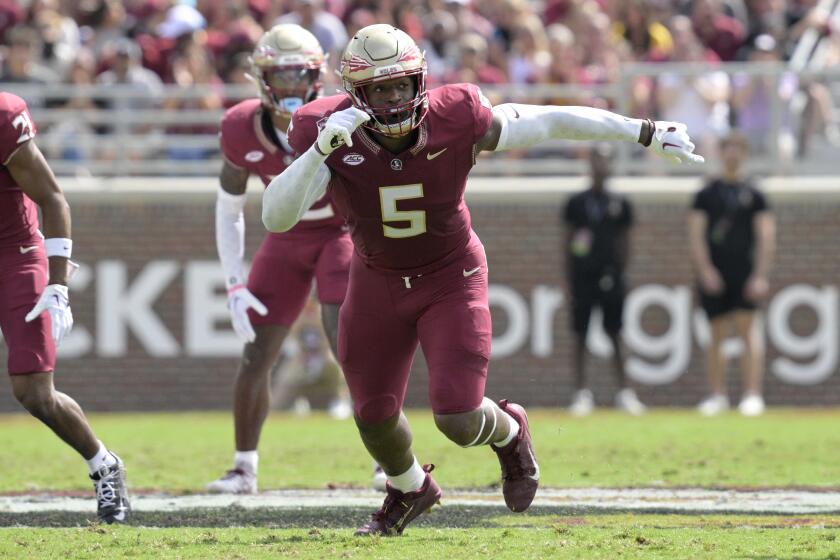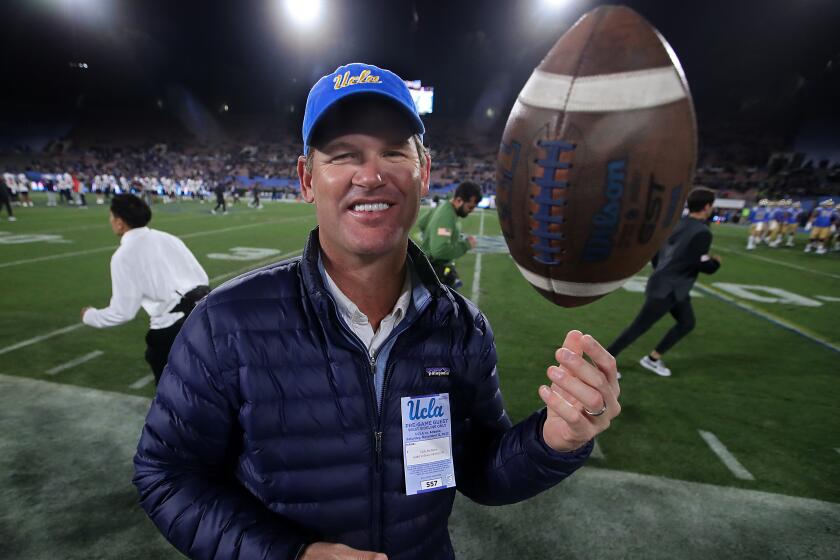Golf’s links to success
ANYONE who ever plans to play a round of golf with a boss, prospective employer, co-worker or client needs to know that something more important than the outcome is often at stake.
“By your actions on the course, you are being judged,” said Laird Small, director of the Pebble Beach Golf Academy. “You can tell how they handle change. You get to see how they perform under pressure.”
Do you know what messages you’re sending when you play? Golf pros say they can tell a lot about a player’s personality, ethics and state of mind by their demeanor on the greens.
In fact, corporate executives occasionally ask Glenn Deck, director of instruction at Oak Creek Golf Club in Irvine, to evaluate job candidates by playing nine rounds and reporting back with his impressions.
“It’s a different way to analyze them,” Deck said. “Everyone knows how to prepare for an interview these days, but how do you prepare to go out and play nine holes of golf?”
Not very experienced? Not to worry. His report has nothing to do with how well the person plays.
“The biggest thing is how they conduct themselves in public. Do they show up on time? How do they set up the appointment? Their dress? I look at how their shoes are by the polish. Their slacks, are they pressed?”
Once those first impressions are out of the way, Deck observes the player’s approach to the game. “You can tell a bit by their tempo, how fast they swing and walk up to the ball. You can tell if they are more methodical or if they just hit it and get up and go.”
He assesses the player’s character and manners, “how open and outgoing, how talkative they are, if they’re professional and follow up with a thank-you note.”
Such characteristics are crucial in jobs such as sales that might involve playing golf with customers. With the club on the face of the ball for less than a second, the most important stuff often happens between shots.
“A lot of people think a lot of business is done on the course,” Small said. “It’s not really true. What is true is relationships are built. People bring clients for a lavish weekend. They don’t talk business, but they call the next week and say, ‘Wasn’t that a great time?’ ”
Conversely, if the game was no fun, a deal could fall apart. “If you do not enjoy being on a course, you don’t want to be in business with him for the next 20 years,” Small said.
Behavior on the course can give clues to someone’s psyche off the course, especially when things go wrong.
“How do we handle it when we’re not playing well? Do we have a pity party?” Small asked. “Or do we say, ‘What can I learn from this?’ Do they then engage in a question: How can I make what I do a little better?”
Many competitive, Type A personalities get upset playing golf because it’s a tough game to perfect. “Does it mean they have a great drive to excel and do not take mediocrity as a standard?” Small asked. “Or are they a crybaby?”
Pros can tell a lot by how long players stew and whether they take direction and act to change the situation.
“It’s OK to be frustrated,” Deck said. However, he looks for people to be able to put it behind them and have a good time anyway, focusing on what’s in front of them instead of past mistakes.
That’s sometimes easier said than done. Moe Golchin, a caddy at Brentwood Country Club sees moguls lose their cool all the time.
“Guys who are so good at what they do Monday through Friday are frustrated to not be able to hit it in a Tiger Woods-like fashion,” he said. “It comes out in self-loathing. They beat themselves up.”
Some people turn that anger outward, lashing out at those around them. “I’ve seen a club or two be thrown,” Deck said.
It’s often easy to discern how people will manage and treat their employees and co-workers by the way they interact with their caddies and fellow players. Golchin once gave a bad club, by accident, to an especially well-liked TV executive who flubbed the shot but didn’t pick on the caddy.
“He said, ‘Oh, I yanked that. That was on me.’ He took responsibility.”
Others have tried to pin their mistakes on Golchin. One guy complained, “ ‘You missed that reed.’ He was blaming me. I said, ‘If I had had that putter, I wouldn’t have.’ ”
Sometimes players simply “check out” when the game turns lousy. “What golf demands and what life demands is you’re here, present,” Small said. “If you check out here, how are you checked out at home with relationships, families, co-workers?”
Sportsmanship on the course and ethics on the job are closely linked as well, but Small said it’s not fair to judge all players negatively if they don’t play by the book.
“Golf has very strict rules, but a lot of people don’t play much and may not know the rules,” he said. For instance, if a person moves a ball because they are playing just for fun, “it does not mean they will cheat in real life.”
Small has noticed that the concerns of men and women on the course are often very different -- and quite revealing.
“Guys don’t want to be embarrassed, and gals don’t want to hold up the golf course,” Small said. “Ladies don’t feel they have as good a skill set, which may or may not be true. Women wind up being rushed, and it affects their performance. Guys don’t care who is behind them. They say, “ ‘I’m ahead of you. Tough.’ ”
However, men are often obsessed with performance. “They don’t want to top the ball in front of their boss or client. They don’t want to look bad.”
Women and men could learn a little from one another to let those fears go, Small said. Deck also advises people to take a Zen-like attitude.
“Be yourself. Relax and have fun,” he said. “Expect to hit good shots. Expect to have a few bad shots.”
It’s still a game, after all.
*
(BEGIN TEXT OF INFOBOX)
How not to look green
Making a good impression on the golf course isn’t that difficult, even for the most novice of players. Experts offer these tips:
* If possible, take a few lessons first.
* Call in advance to confirm your time on the course. Always show up on time.
* Inquire about the dress code and follow it. Generally, no denim is allowed.
* Stand facing the player who is swinging, never behind or in the person’s peripheral vision.
* Never walk on the line between someone’s ball and the cup.
* Be silent when another player swings.
* Say “nice play” rather than “nice shot” to compliment another golfer.
* When it’s your turn, have gloves on, club selected, tee and ball in hand.
* Stand with feet shoulder distance apart and flex your knees.
* Hinge at the hips 30 to 40 degrees and keep your back straight. Swing in a circular motion.
* Be patient. Don’t ever hit into the group in front of you.
* Relax. Tension leads to mistakes.
* If you mess up, have a sense of humor and move on. Don’t sulk or get angry.
* Offer to buy a round of drinks when the beverage cart arrives.
* When the game ends, shake hands with fellow players and tip the caddy $40 to $50.
* Follow up with a thank-you note to the pro or host.
-- Jenny Hontz
More to Read
Get our high school sports newsletter
Prep Rally is devoted to the SoCal high school sports experience, bringing you scores, stories and a behind-the-scenes look at what makes prep sports so popular.
You may occasionally receive promotional content from the Los Angeles Times.






